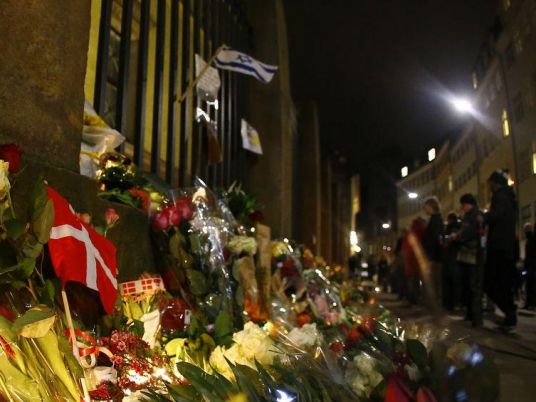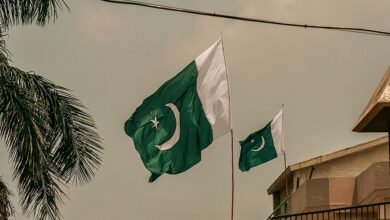
Tens of thousands of Danes have gathered for a torch-lit vigil in Copenhagen to commemorate the victims of two shootings that shocked the nation and heightened fears of a new surge in anti-Semitic violence.
Stunned citizens in what is usually one of the world’s most peaceful countries flocked to Monday’s rally in a square near the cultural center where the first attack took place. Many held flaming torches aloft, illuminating the chilly winter night.
A police spokesman estimated that some 30,000 people had turned out to pay tribute to the two victims.
The first, 55-year-old filmmaker Finn Norgaard, was killed when a gunman opened fire during a debate on free speech on Saturday.
The same attacker then targeted the city’s main synagogue, killing 37-year-old Dan Uzan.
“Tonight I want to tell all Danish Jews: you are not alone. An attack on the Jews of Denmark is an attack on Denmark, on all of us,” Prime Minister Helle Thorning-Schmidt told the crowd at the vigil.
Faced with the spectacle of European Jews being again targeted by extremists, just over a month after similar attacks in Paris, governments were scrambling to reassure their Jewish communities.
Thorning-Schmidt said Danes had come together to “insist on living free and safe lives in a democratic country.”
“When others try to scare us and tear us apart, our response is always a strong community,” she declared.
US President Barack Obama expressed solidarity with Denmark in a phone call with Thorning-Schmidt on Monday. The two leaders “agreed on the need to work together to confront attacks on freedom of expression as well as against anti-Semitic violence,” the White House said in a statement.
Two charged with helping gunman
Charlotte Jensen, a 33-year-old social educator at the rally, said: “We’ve actually been waiting for this for so many years and then suddenly it happens.
“Right now, my thoughts go to the Jewish community. We will survive, we will stand firm but I’m afraid for the Jewish community,” she said.
Earlier, Thorning-Schmidt urged Jews to disregard Israeli Prime Minister Benjamin Netanyahu’s call for them to seek refuge in the Jewish state.
She said Denmark “wouldn’t be the same without the Jewish community”.
The 22-year-old gunman, a Dane of Palestinian origin named by media as Omar El-Hussein, was killed by police in a shootout Sunday.
He was said to have been released from prison just two weeks ago after serving a term for aggravated assault—raising fears he may have become radicalized behind bars.
Two suspects were on Monday charged with helping the gunman dispose of his weapon and giving him somewhere to hide, the lawyer of one of the men, Michael Juul Eriksen, told AFP.
He said the unnamed men denied the charges “completely”.
After spraying bullets at the cultural center during a debate Saturday on Islam and free speech, killing the documentary film-maker, the attacker opened fire Sunday on a synagogue, killing Uzan, who had been acting as a guard.
Five policemen were also wounded in the two incidents before the gunman was tracked down to a working-class district of Copenhagen.
The attacks bore some of the hallmarks of last month’s jihadist attacks in Paris in which 17 people died and which targeted satirical magazine Charlie Hebdo, police officers and a Jewish supermarket.
The suspected target of the shooting at the cultural center was a controversial Swedish cartoonist, Lars Vilks, who sparked fury in the Muslim world in 2007 by depicting the Prophet Mohammed as a dog.
Swedish police said Monday he had gone into hiding.
‘Pan-European epidemic’
The violence sparked fresh fears of an exodus of European Jews, terrorized by the third major anti-Semitic attack on the continent in under a year, after a French Islamist radical was also accused of shooting dead four people at the Jewish Museum in Brussels in May 2014.
Netanyahu urged European Jews to move to his country after the Copenhagen shooting, echoing a similar call made after the Paris attacks.
The Nazi-hunting Simon Wiesenthal Centre said it feared a “pan-European epidemic”.
Flags were flown at half-mast across Denmark on Monday.
Tearful Danes laid a sea of flowers at the sites of the killings—and dozens of bouquets were also left outside a building in the neighborhood of Noerrebro where El-Hussein was shot dead.
Four young men wearing hooded tops and with their faces covered later came to move the bouquets, saying it was un-Islamic to leave flowers for deaths.
They said they were from Mjoelerparken, the same area as El-Hussein, where many residents are immigrants.
One of the men, identifying himself only as Mohammed, said: “He was a good guy. He wasn’t a terrorist. It’s Denmark, the United States and Israel who are the terrorists.”
France, which has the largest Jewish and Muslim communities in Europe, was itself reeling on Monday from the desecration of hundreds of tombs at a Jewish cemetery.
President Francois Hollande said Jews belonged in Europe and “in particular in France”.
Thorning-Schmidt warned against stigmatizing Muslims over the attack.
“This is a conflict between the core values of our society and violent extremists,” she said. “This is not a conflict between Muslims and non-Muslims.”




